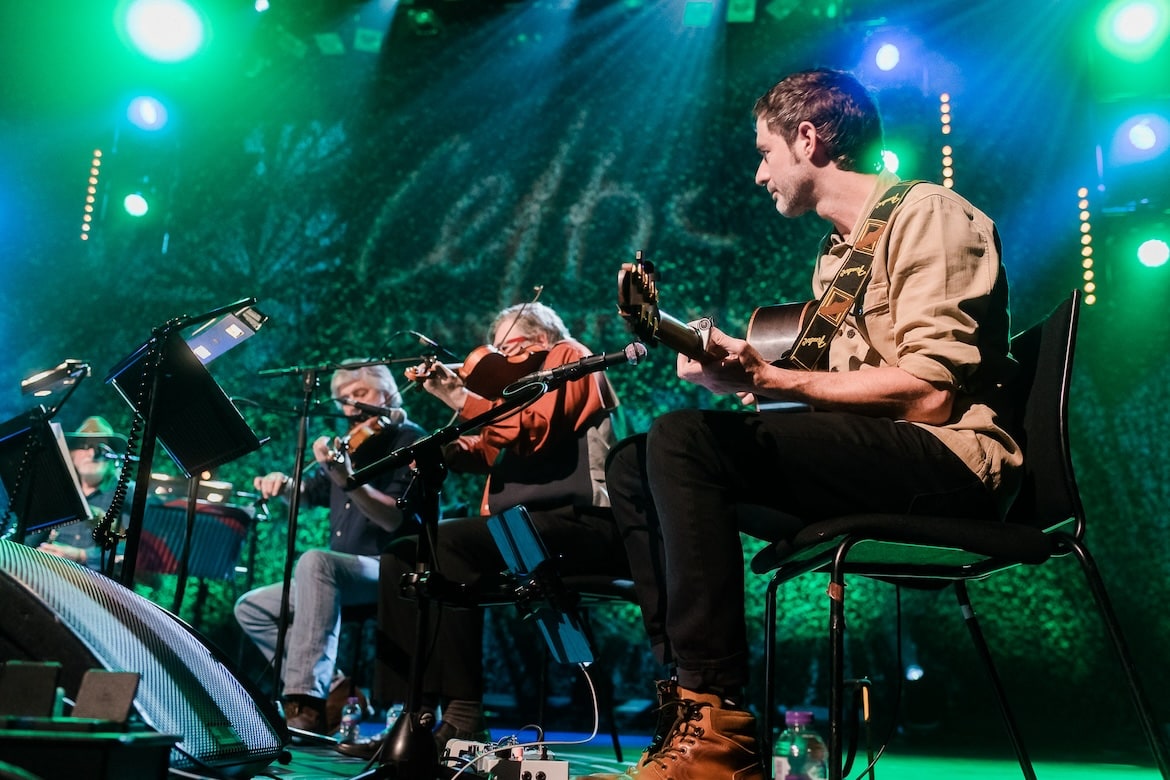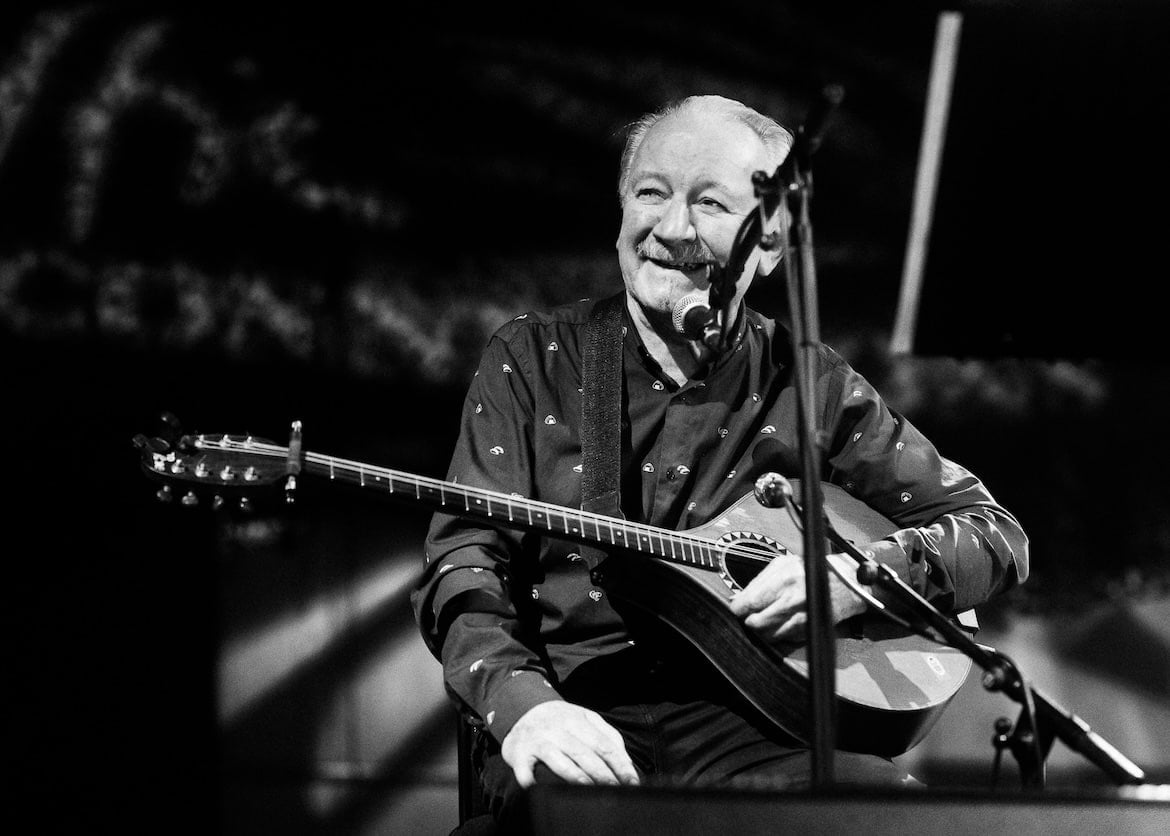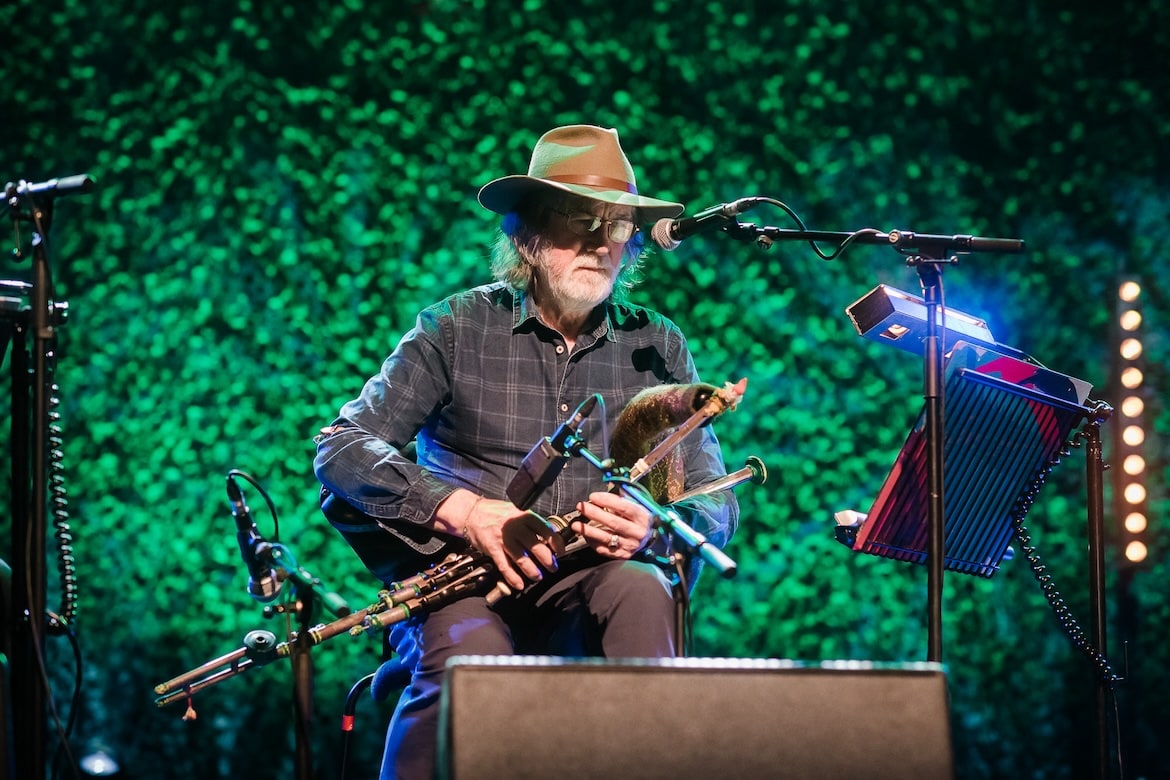Within the folk music tradition, there is an awful lot of apparently interminable waiting. The Irish night visiting song, ‘The Bay of Biscay’, for instance, sees poor Mary wait ‘seven long years’ for her true love, William, to return, only to find him transformed into a blanched ghost, the vitality cruelly sucked from him during his lengthy absence. By sharp contrast, there was no shortage of vitality inside Glasgow’s exquisite Royal Concert Hall on Monday night. Still, the avid, longtime fans who packed out the auditorium hadn’t waited a mere seven years to hear one of the most famous groups in the history of traditional Irish music. Oh no. They had waited forty.
Despite only being active for five years, between 1975 and 1979, The Bothy Band – affectionately known as “The Bothys” – effectively reinvented traditional Irish music over the course of three studio records and a live album. After their last performance in 1979, the original members parted ways to focus on a series of other high-profile musical projects; Dónal Lunny went on to form Moving Hearts, Mícheál Ó Domhnaill formed Nightnoise with Bill Oskay in ’84, which Tríona Ní Dhomhnaill would later join, alongside which, they also formed Relativity (1985) with Johnny and Phil Cunningham, and Matt Molloy joined The Chieftains, to name just a few examples. Mícheál and the remarkable Donegal fiddle player Tommy Peoples tragically passed away in 2006 and 2018, respectively. In October 2023, however, after a hiatus of almost forty-five years, The Bothy Band unexpectedly reunited for an Irish TV documentary, and reminiscing and performing again relit an old flame for these giants of the folk world. Joined by newest member Seán Óg Graham on guitar, they finally accepted a longstanding invitation to perform at Celtic Connections ahead of their first Irish tour in four decades this spring, in a return that The Irish News described as “somewhat on par with the Second Coming, in some people’s eyes”.
Little wonder, then, that the anticipation in the auditorium was almost tangible, but surely the fans could wait just a little while longer. Multi-award-winning singer-songwriter Kris Drever and his guitar had been given the unenviable task of occupying the audience for the short time that stood between them and The Bothy Band, and it is hard to imagine a better choice for the task. With his characteristically dry wit and disarming modesty, he quipped, “This was the only way they would let me in”, and the audience was immediately on side. The Orcadian delighted the excited crowd by opening with ‘The Covering Ground’, a fittingly Irish jig from Cork, and continued to captivate with highlights ‘Hunker Down’ and ‘More Than You Know’ from his brilliant lockdown release, ‘Where The World Is Thin’. ‘Scapa Flow’ and ‘Greenland Whale Fisheries’ (the song was, indeed, much better than its title, just as he had assured us) showcased his exceptional storytelling abilities, and it should also be noted that the quantity of suspense-building tuning throughout the set was optimal, even by Goldilocks’ standards.
As an avid Drever fan who has seen him perform three times in as many months, I felt a little underwhelmed by the choice of setlist. In 2023, Drever released an outstanding ‘Best Of’ LP of re-recorded earlier material, and yet here, he sold himself short by electing to play only his most recent songs. It seemed a shame – an opportunity missed – to opt out of sharing even a glimmer of his veritable goldmine of a back catalogue with a room of open-hearted folk fans who may not necessarily have heard him perform before. Even just replacing the predictable, rather beige “second moon song”, ‘I’ll Always Leave the Light On’ with its ethereal, oft-neglected predecessor, ‘Wintermoon‘, would have freshened up the setlist no end. Still, Drever may have shot just short of the moon, but he certainly landed among the stars, and his engaging set culminated in lively fan favourite, ‘If Wishes Were Horses’, which set feet tapping and heads bobbing enthusiastically. I was left in no doubt whatsoever that Drever had extended his reach even further into the hearts of the folk connoisseurs of Glasgow and beyond by the time his half hour was up.

And with that, the time had finally come. The Bothy Band kicked off their much-anticipated set with the lively reel ‘The Salamanca’, the first line of which immediately sent the audience into a frenzy of nostalgic euphoria. Jigs and reels came thick and fast throughout the evening, including guaranteed crowd-pleasers such as ‘The Pipe on the Hob’, ‘The Kid on the Mountain’, and ‘Rosie Finn’s Favourite’. These energetic, pulse-raising numbers were offset by more reflective instrumental moments; the group experimented, for instance, with slowing down the pace of ‘The Maids of Mitchelstown’, during which Paddy Glackin and Kevin Burke shone on fiddle, bolstered by the rest of the group. The encore concluded with ‘The Green Groves of Erin’, and fittingly so being, as it is, the final track on the group’s greatest hits album, ‘The Best of the Bothy Band’ (1980). It was an undeniable hit with the crowd, sending us out on a high. The understandably packed nature of the venue left little floor space for dancing, but some shed all inhibitions and spilled out into the stairwells, unable to suppress the infectious rhythm a moment longer.
Although a predominantly instrumental set, a few songs were interspersed within the tunes, three of which featured solos from the legendary Tríona ní Dhomhnaill. During the nonetheless beautiful ‘One Starry Night’, written by Davy Spillane and Seán Tyrrell, Tríona seemed to struggle to find her confidence and openly acknowledged her nerves at the prospect of singing again, her voice struggling to achieve the higher register she once reached so effortlessly. She had, however, more than found her footing by the time we reached ‘The Maid of Coolmore’ (a stunning song also performed by the likes of Cara Dillon), which was deeply affecting and one of the very highest in an evening of high points. During the encore, the audience relished the opportunity to join in with ‘Do You Love an Apple?’ – a diverting song which I had previously heard performed by the brilliant Ruth Notman – and needed little encouragement to “raise the roof” of the Royal Concert Hall.

One of the most striking elements of the show was the evident camaraderie between the group of musicians, each so immeasurably talented in their own right, bouncing off each other effortlessly despite such a long absence from one another’s musical company. Each player had clearly been granted their own moments to shine, from one tune to the next; ‘Butterfly’, for instance, was headed up by Tríona’s legendary clavinet, while Matt Molloy’s exceptional flute playing rang out in ‘The Laurel Tree’. When it came to ‘The Pipe on the Hob’, uilleann piper Paddy Keenan came into his own, delivering a performance of the kind that once prompted bandmate Dónal Lunny to describe him as “the Jimi Hendrix of the pipes”. The absence of Mícheál was felt most keenly in the loss from the setlist of the Gaelic duets he used to perform so brilliantly with Tríona. Still, Lunny was on hand, not only to play the bouzouki with world-class finesse but also to lead in the singing of ‘Casadh an tSúgáin’, a traditional Irish song about unrequited love. “If it weren’t for unrequited love, we’d have far fewer songs!” Lunny mused in just one of many witty quips made by various band members throughout the evening (as much to amuse one another as their audience). It seems inevitable that Mícheál would have glowed to see the band he so passionately nurtured all those decades ago finally gracing the stage of Scotland’s most illustrious folk music festival, both bringing so much delight to their audience and, perhaps most importantly, thoroughly enjoying every minute themselves.

I have to confess that 1979 isn’t within my living memory, but as we sent The Bothy Band off on their merry way with a second and thoroughly well-deserved standing ovation, not a soul could fail to have been moved by the momentousness of the occasion. In what was a landmark moment in the history of Celtic Connections, one that will leave a resounding echo for many years to come, The Bothy Band smashed all dizzyingly elevated expectations, and it was both an honour and a pleasure to be in the room where it happened.
The Bothy Band continue their tour in Ireland throughout the spring and summer of 2024.
